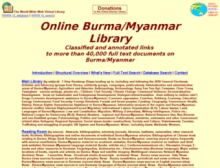Resource information
ABSTRACT: "Fleeing state-sponsored violence and economic decline in their home country, hundreds
of thousands of Myanmar émigrés have in recent years crossed the border into
Thailand
in search of a better life.
For the estimated 2 million Myanmar migrants now living there,
however, life in Thailand presents its own challenges. With insufficient legal provisions
to handle the influx of migrants, the Thai government has largely turned a blind eye to
abuse and exploitation suffered by migrant workers. Yet despite poor working conditions
and exploitation, there does not appear to be much of a call to improve conditions
through mobilization among the Myanmar migrant community.
The marked absence of mobilization on any level thus begs the question: why is the
migrant population in Thailand so passive in the face of severe strain and exploitation?
This thesis explores the issue of non-
mobilization among
migrant groups, using as a
framework two core concepts: social mobilization and precarity. The long-standing
discourse on social mobilization focuses on social and political action in response to
societal strain, taking into account other factors such as
access to resources and
institutional opportunities. Precarity, a newer concept and compliment to the established
social mobilization debates,
has been used to describe a
lifestyle characterized by
critical
social, economic, and political insecurity...


